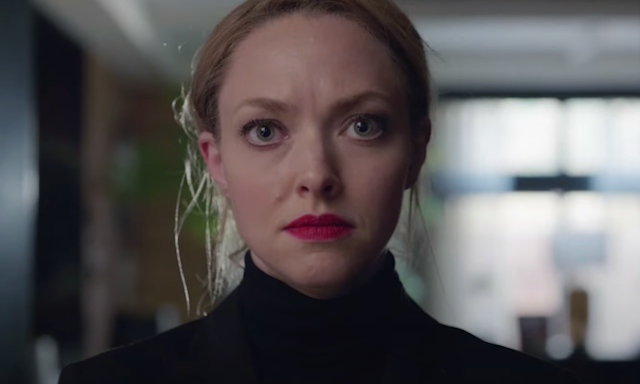It's telling that much of the buzzy TV shows of late concern fraudsters in American life.
With a complete bullshit artist for a US President in Donald Trump, it's not surprising that there's been a run of scam-related TV shows, such as Netflix's 'Inventing Anna', the upcoming Apple TV+ show 'WeCrashed', or Disney+'s efforts with Theranos and Elizabeth Holmes. Adapted from the cracking podcast series, 'The Dropout' dramatises the meteoric rise and calamitous fall of the fraudster CEO who managed to convince everyone from Henry Kissinger and Rupert Murdoch to Bill Clinton and Joe Biden that she was real and so was her company.
Over the course of eight episodes, 'The Dropout' goes through painstaking detail to show just how ridiculous the scamming went. Between these moments of audacious fraud however, Amanda Seyfried's performance as Holmes is the one thing that keeps it afloat. She captures the weird, painfully awkward energy that Holmes gives off in such exacting detail that you're more tuned in for her than anything else. The opening episode, for example, sees Holmes dance like she's been electrocuted in front of a poster of Steve Jobs in her teenage bedroom. Later, she gyrates with her age-inappropriate partner and accomplice Sunny Balwani - played with theatrical gusto by Naveen Andrews - in her palatial mansion.
Yet for all these comedically cringe moments, 'The Dropout' seems to be playing both sides of the argument but never making any of them fully stick. Elizabeth Holmes was, on the face of it at least, a trailblazing icon whom women in STEM looked up to with pride and admiration. Yet, in the very same moment, they show her as this vainglorious, egotistical sociopath who is more than OK with putting people's lives at risk in order to get ahead. Then, it tries to flip things over and present her as a victim of other people's misdeeds; that she was bamboozled by the praise heaped upon her and that the influence of Sunny Balwani, George Shultz, the media, and the followers around her. Over the course of eight episodes, sure, you can take in all those opposing views and make it fit inside a structure.
Yet, in watching 'The Dropout', it's almost as if the writers themselves didn't know what to make of Elizabeth Holmes to begin with. Was she a scam artist? Was she getting off on her own bullshit? Did she really believe in herself so much that she couldn't countenance the idea of being wrong? By its closing episodes when twice-Pulitzer Prize-winning journalist John Carreyou makes an appearance, you begin to see the clear lines being drawn. 'The Dropout' is adapted from the podcast of the same name and not John Carreyou's book, 'Bad Blood', which explains why his presence is pushed to a later point in the story rather than front-loading his investigation.
Compared to the podcast, 'The Dropout' doesn't have the same sense of integrity. Where the podcast used real interviews from characters in the show, here we have to rely on the performances of William H. Macy in very distracting contacts, or Laurie Metcalf as the flatly sceptical professor who knew from the outset that Elizabeth Holmes was full of shit. They're all strong performances sure, but there's something quite flat and uninteresting about both the writing and directing throughout that just cheapens it all. This becomes starkly apparent when you realise that so much of 'The Dropout' could have been easily collapsed down and condensed into a two-hour movie rather than making heavy weather of it and turning it into an eight-hour miniseries - a common complaint about most true-life adaptations on TV nowadays.
'The Dropout' begins on Disney+ from March 3rd with the first three episodes of the series. The remaining five episodes will run weekly until April 7th.



















































































